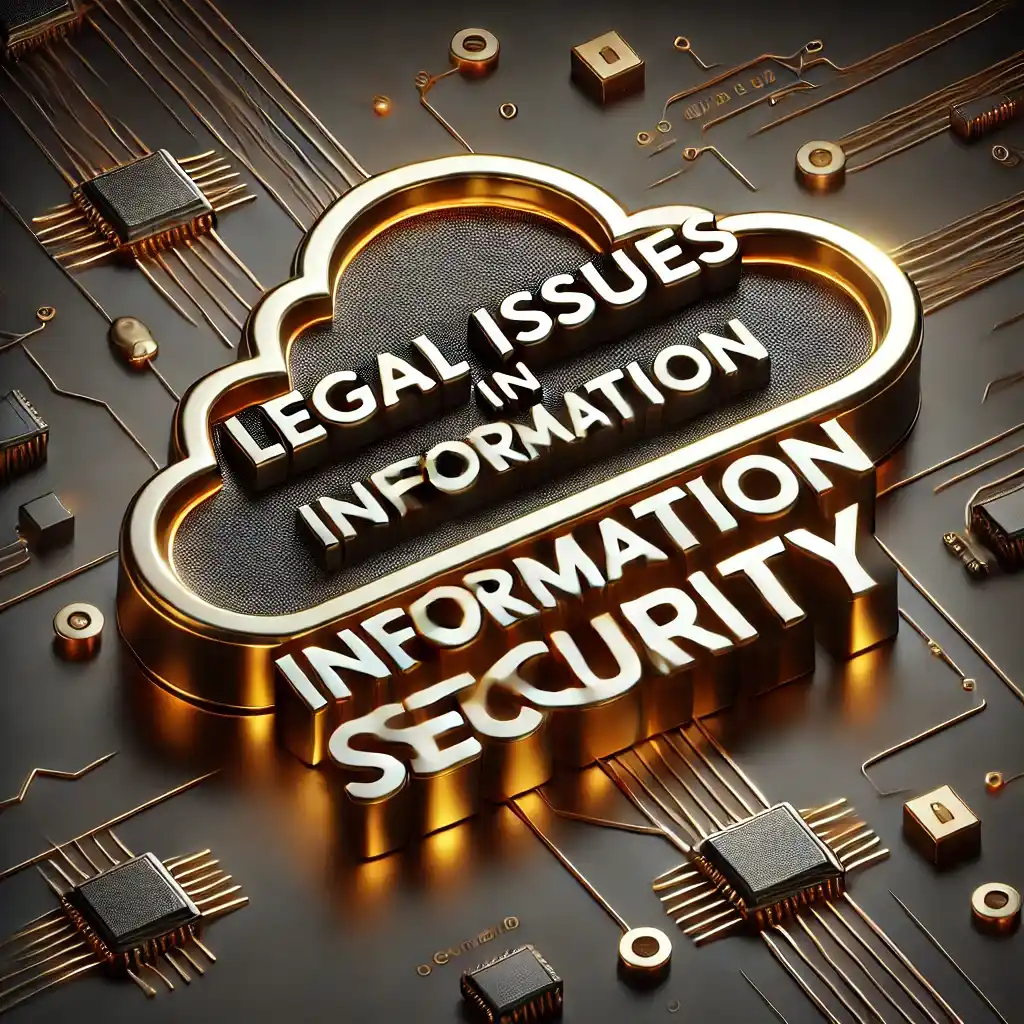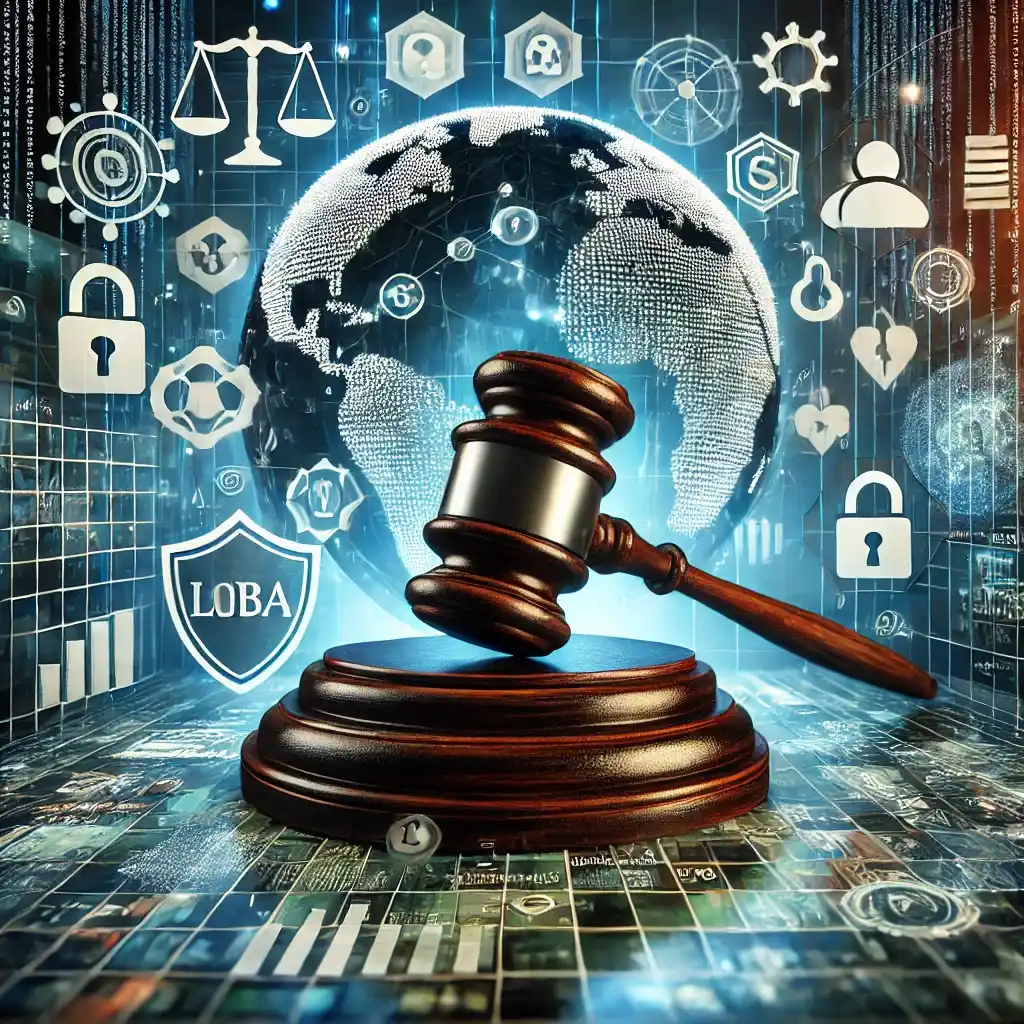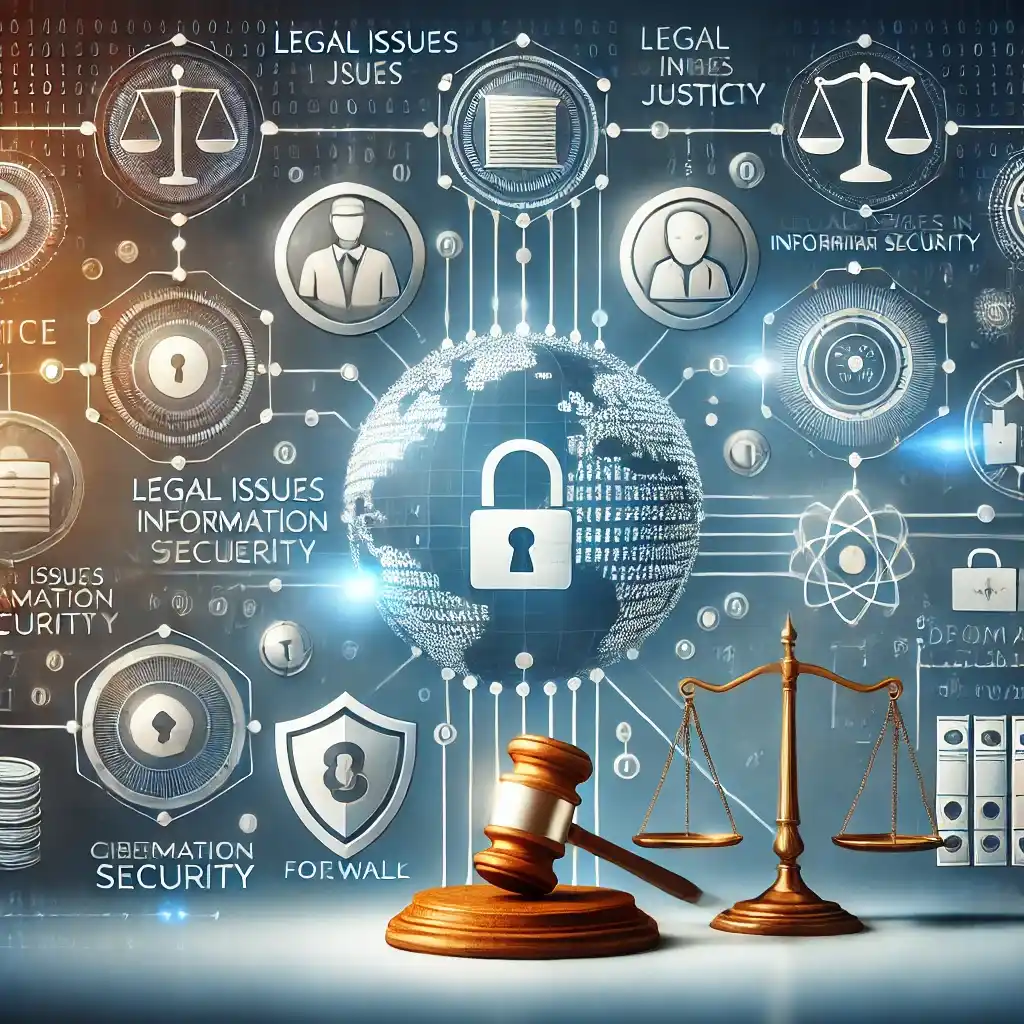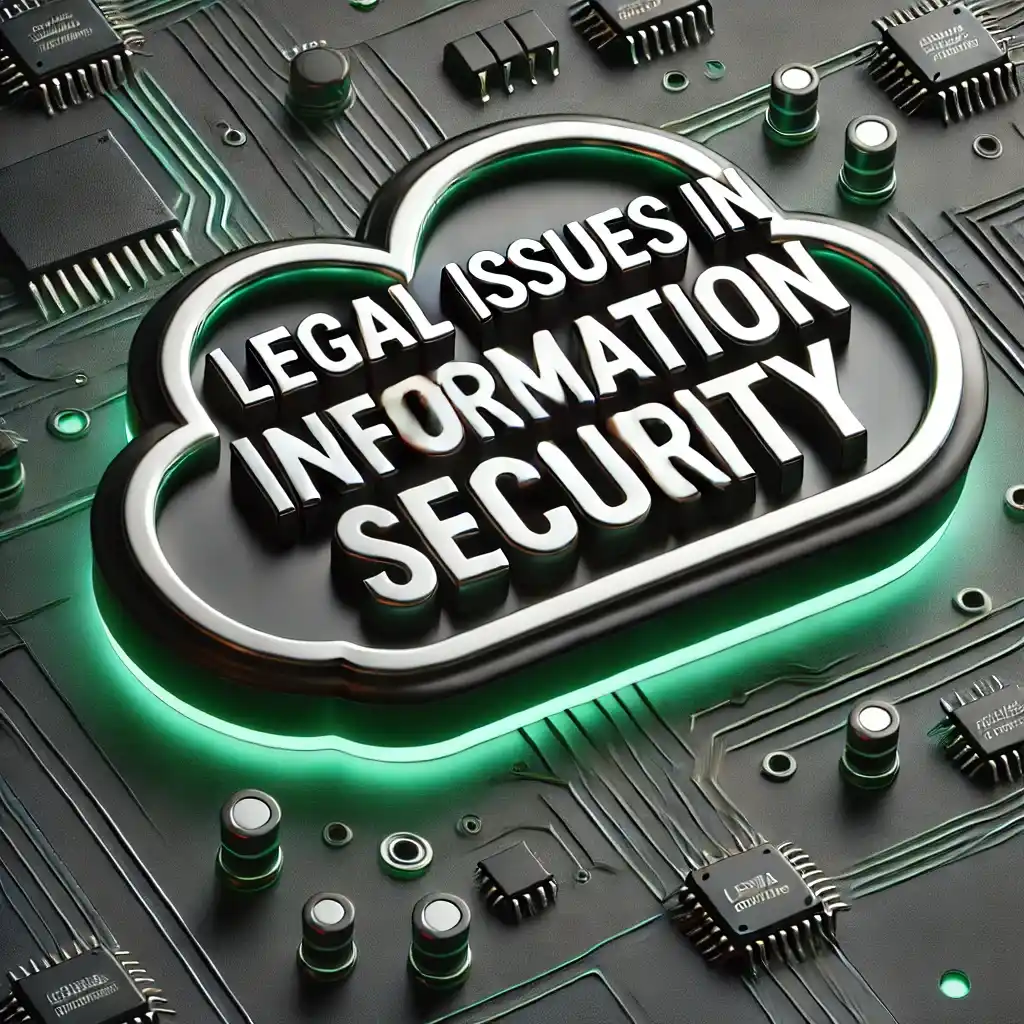In today’s digital landscape, legal issues in information security are a growing concern for businesses and individuals alike. As technology evolves and more personal and sensitive data is stored and exchanged, the need for robust information security practices has never been more urgent. In this article, we’ll explore the legal issues in information security, why they matter, the key legal challenges, and how organizations can navigate the evolving landscape of cybersecurity laws.
1. Introduction to Legal Issues in Information Security
The digital age has brought incredible advancements in how we connect, communicate, and store data. However, with these advancements comes the responsibility to ensure that sensitive information is protected. This is where legal issues in information security become crucial. Legal frameworks provide the necessary structure for organizations to ensure that data is safeguarded against unauthorized access, cyber-attacks, and other potential threats.
Understanding the Importance of Legal Frameworks
Legal frameworks play a pivotal role in ensuring that both individuals and businesses comply with certain standards when handling sensitive information. Information security laws provide clear guidelines on how data should be stored, accessed, and transmitted to minimize risks like identity theft, fraud, and data breaches. These regulations help set expectations and ensure accountability, making it easier for individuals and organizations to understand their obligations.
One of the most important aspects of legal issues in information security is the alignment of security measures with regulatory requirements. Failing to comply with these regulations can result in legal liabilities, financial penalties, and reputational harm.

2. Key Legal Challenges in Information Security
Organizations around the world face various legal challenges in information security as they work to protect their data. These challenges often arise when businesses struggle to balance their need for cybersecurity with their legal obligations. Understanding the legal risks in cybersecurity is key to minimizing legal exposure.
Common Legal Hurdles Faced by Organizations
One of the most significant challenges is navigating the complex and often conflicting laws governing data protection. For example, organizations that operate globally must comply with a variety of international data protection laws, such as the European Union’s General Data Protection Regulation (GDPR) and the California Consumer Privacy Act (CCPA) in the United States. These laws set strict standards for how companies collect, store, and manage data, but they may have different requirements based on the jurisdiction.
Furthermore, businesses often face difficulties in ensuring compliance with cybersecurity regulations while also maintaining operational flexibility. Balancing these two objectives can be tricky, especially when cybersecurity legal issues require organizations to adopt stringent practices that may interfere with business processes.
Impact of Legal Issues on Cybersecurity and Privacy
Legal issues in information security also extend to privacy laws, which protect personal information from being exploited. Failure to adhere to privacy and data protection laws can result in significant legal repercussions, including hefty fines, litigation, and loss of customer trust. Understanding the legal responsibilities around cybersecurity and data privacy is essential for organizations to mitigate risks and avoid costly mistakes.
3. Privacy and Data Protection Laws
Understanding Global Privacy Laws
The core purpose of privacy and data protection laws is to safeguard individuals’ personal data and prevent unauthorized access or misuse. Laws like the GDPR and CCPA are among the most well-known examples of data protection regulations. These laws enforce strict guidelines on how businesses should handle personal data, ensuring that individuals’ rights are respected and their data is protected.
The GDPR, for instance, requires organizations to obtain explicit consent from individuals before collecting their data, while also providing individuals the right to access, modify, or delete their personal data. The CCPA, on the other hand, gives California residents the right to know what data is being collected about them, as well as the right to opt-out of having their data sold to third parties.
How Data Protection Laws Shape Security Practices
Data protection laws have a significant impact on how organizations develop their information security strategies. These laws require businesses to implement strong security controls to protect personal data, such as encryption, firewalls, and regular audits. By aligning their practices with data protection laws, organizations can enhance their security posture and reduce the risk of non-compliance.
Organizations that fail to comply with data protection laws risk facing severe legal consequences, including substantial fines and damage to their reputation. Moreover, compliance with these laws also fosters trust with customers, helping businesses build a positive image and retain their clientele.

4. Cybersecurity Legal Issues and Compliance
Cybersecurity Regulations
To mitigate cybersecurity legal issues, governments worldwide have enacted cybersecurity regulations that organizations must follow. These regulations often focus on ensuring that businesses have appropriate security measures in place to prevent cyber-attacks, data breaches, and other threats. Examples of cybersecurity regulations include the Health Insurance Portability and Accountability Act (HIPAA) for the healthcare sector and the Sarbanes-Oxley Act (SOX) for publicly traded companies.
These regulations set clear standards for security practices, including the implementation of risk management processes, security assessments, and data breach notification protocols. By adhering to these regulations, businesses not only reduce their exposure to legal risks but also demonstrate their commitment to safeguarding sensitive information.
Legal Responsibilities for Ensuring Cybersecurity
Businesses have a legal responsibility to ensure the security of the data they handle, particularly when dealing with sensitive information such as financial records, medical records, or personally identifiable information. Failure to implement adequate cybersecurity measures can result in legal action, financial penalties, and reputational harm.
Organizations should consult legal experts to ensure they understand their obligations under various cybersecurity laws and regulations. This proactive approach can help prevent legal issues and ensure that businesses are adequately prepared for potential security incidents.
5. Legal Risks and Liabilities in Cybersecurity
Risks of Security Failures
One of the most significant legal risks in cybersecurity is the failure to protect sensitive data from breaches. If a breach occurs and personal data is exposed, organizations may be held liable for negligence. Depending on the severity of the breach and the laws in place, companies could face lawsuits, regulatory fines, and penalties.
Organizations that experience a data breach are also likely to suffer reputational damage, which can affect their customer base and long-term viability. As such, addressing legal risks proactively and investing in robust security measures is essential for avoiding costly legal actions.
Consequences of Non-Compliance
Failure to comply with cybersecurity laws and regulations can result in significant penalties. For example, under the GDPR, organizations that violate the regulation could face fines up to €20 million or 4% of global annual turnover, whichever is higher. Similarly, companies that fail to comply with data protection laws like the CCPA may be subject to fines and lawsuits from affected individuals.
Organizations that fail to address legal risks in cybersecurity may also face reputational harm, as consumers and business partners may question their ability to protect sensitive data. Thus, staying compliant with cybersecurity regulations is not just a legal obligation but a critical element of business success.

6. Regulatory Frameworks for Information Security
National and International Regulations
Regulatory frameworks for information security are essential in maintaining global standards for data protection. Different countries have their own set of information security regulations, and organizations that operate internationally must navigate this complexity to ensure compliance. For instance, the GDPR applies to all organizations handling data of EU citizens, regardless of where the company is based.
In addition to national laws, international organizations like the International Organization for Standardization (ISO) provide guidelines for best practices in information security. Adhering to these international standards helps businesses meet their legal responsibilities and ensure the security of their data.
Impact on Organizational Cybersecurity Strategies
By aligning their cybersecurity strategies with national and international regulations, organizations can ensure they meet legal obligations while also protecting their data. Regulatory compliance also helps businesses build trust with customers, employees, and other stakeholders.
7. Legal Implications of Data Breaches
Consequences of Data Breaches
When a data breach occurs, the legal implications can be severe. Businesses can face legal actions from customers, regulatory authorities, and even competitors. In some cases, data breaches have led to large settlements and costly lawsuits.
In addition to the financial consequences, companies may also face regulatory fines for failing to report breaches promptly or for not taking adequate steps to protect sensitive data. Legal consequences of data breaches can also include criminal charges for negligence or failure to comply with cybersecurity laws.
Case Studies of Legal Actions
Case studies of high-profile data breaches illustrate the potential legal ramifications. For example, in 2017, the Equifax data breach led to the exposure of personal data of millions of individuals, resulting in a $700 million settlement with the Federal Trade Commission (FTC).
8. Cybercrime, Legal Enforcement, and Consequences
Legal Actions Against Cybercriminals
Cybercrime is a significant threat to information security, and laws have been enacted to address cybercriminal activities. Hackers, identity thieves, and other cybercriminals face severe legal consequences under cybercrime laws. These laws are designed to punish individuals who engage in illegal activities like hacking, fraud, and identity theft.
How Laws Address Cybercrime
Governments have implemented cybercrime laws to protect individuals and businesses from malicious attacks. For instance, the Computer Fraud and Abuse Act (CFAA) in the United States criminalizes activities like unauthorized access to computer systems, fraud, and damage to computer networks.

9. International Data Protection and Security Laws
Cross-Border Data Protection
As businesses expand globally, understanding international data protection laws becomes increasingly important. These laws govern how personal data is collected, stored, and transferred across borders. Organizations must ensure they comply with these regulations to avoid legal issues and maintain trust with their customers.
Impact on Data Security Practices
The need for international compliance influences how organizations manage data security. By understanding the legal requirements of different countries and regions, businesses can adopt practices that ensure legal compliance and protect personal data.
10 Difference Between Emerging Legal Trends and Traditional Legal Frameworks in Cybersecurity
| Aspect | Emerging Legal Trends | Traditional Legal Frameworks |
|---|---|---|
| Focus | Focuses on adapting to evolving technologies like AI, IoT, and blockchain. | Primarily focuses on existing systems and static regulations. |
| Regulatory Speed | Dynamic and evolves rapidly to address new threats and innovations. | Slower to update; often struggles to keep pace with technology. |
| Technology Integration | Integrates new technologies into legal frameworks (e.g., AI-driven regulations). | Limited to traditional systems with minimal adaptation to new technologies. |
| Scope of Laws | Covers emerging risks such as AI bias, data localization, and cross-border transfers. | Focuses on foundational issues like data protection and access control. |
| Compliance Requirements | More flexible, encourages innovation alongside security compliance. | Rigid requirements with limited room for interpretation. |
| Data Protection | Focuses on real-time compliance and international data flow laws. | Concentrates on basic privacy laws and data breach penalties. |
| Threat Adaptability | Designed to address zero-day vulnerabilities and advanced cyber threats. | Relies on fixed rules and known threat databases. |
| Global Impact | Aims to create harmonized laws across regions to simplify compliance globally. | Often fragmented with regional and national variations. |
11 FAQs
1. What are the major legal issues in information security?
The key legal issues include data breaches, non-compliance with privacy laws like GDPR and CCPA, cybersecurity regulations, intellectual property theft, and liability for weak security measures.
2. How do privacy and data protection laws affect businesses?
Privacy laws require businesses to protect user data, obtain consent, and prevent unauthorized access. Non-compliance can lead to heavy fines, lawsuits, and a loss of customer trust.
3. What is the role of cybersecurity regulations in protecting data?
Cybersecurity regulations set standards for securing data, conducting audits, and responding to threats. They ensure businesses adopt effective measures to minimize cyber risks.
4. What are the legal consequences of a data breach?
Data breaches can result in fines, legal penalties, lawsuits from affected users, and reputational damage. Companies may also face increased operational costs to recover from breaches.
5. How can businesses stay compliant with international cybersecurity laws?
Businesses must understand regional regulations, implement security protocols, conduct audits, and consult legal experts to ensure compliance with evolving global standards.
14 Conclusion
In an increasingly digital world, understanding and addressing legal issues in information security is critical for businesses and individuals alike. From compliance with privacy laws like GDPR and CCPA to managing cybersecurity regulations and avoiding legal liabilities, staying informed is essential. Emerging trends in AI, blockchain, and cross-border data laws make it even more important to adapt quickly.
Organizations must take proactive measures, such as implementing robust security practices, conducting regular audits, and staying compliant with evolving cybersecurity legal frameworks. By prioritizing legal compliance and data protection, businesses can reduce risks, build trust, and prepare for future challenges in the cybersecurity landscape.
